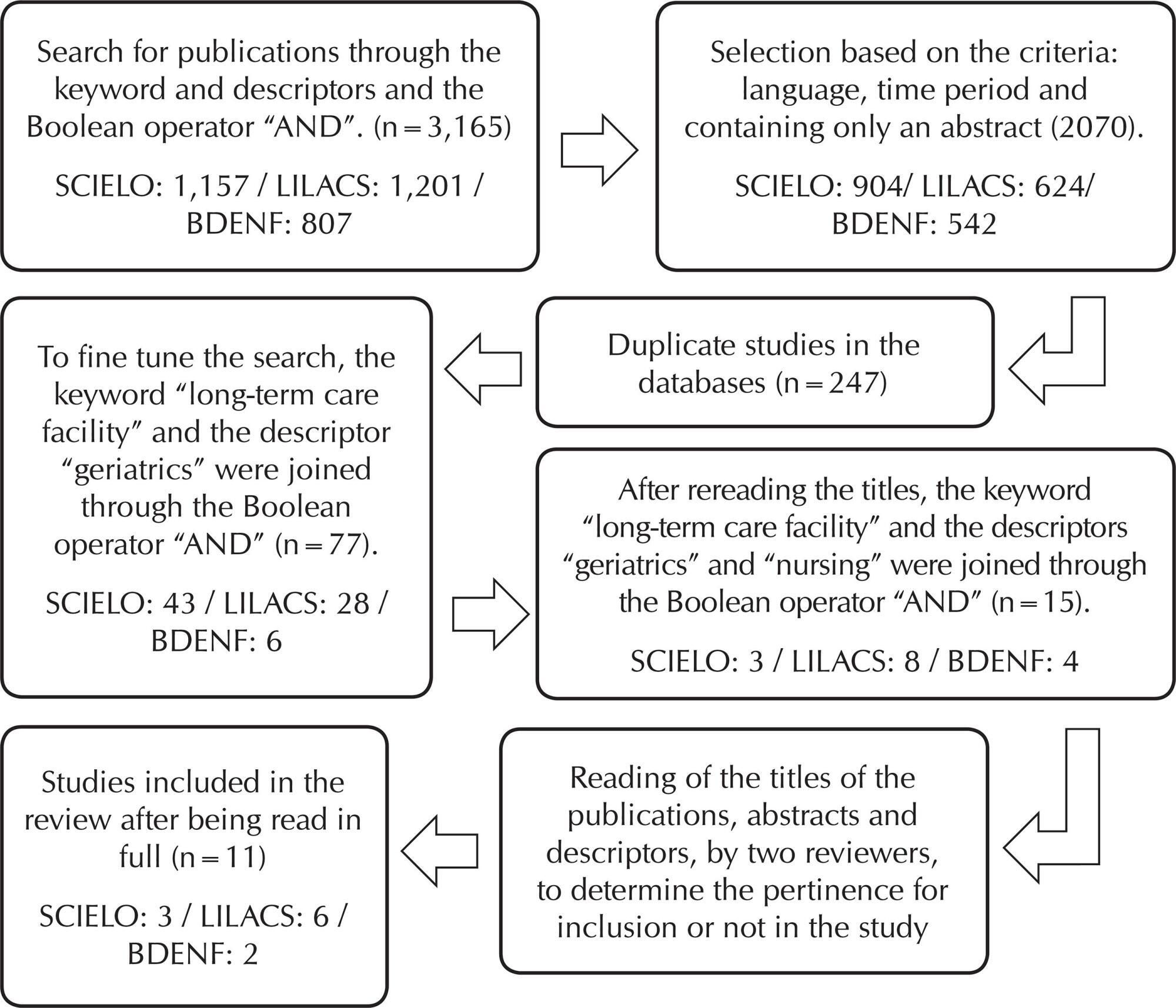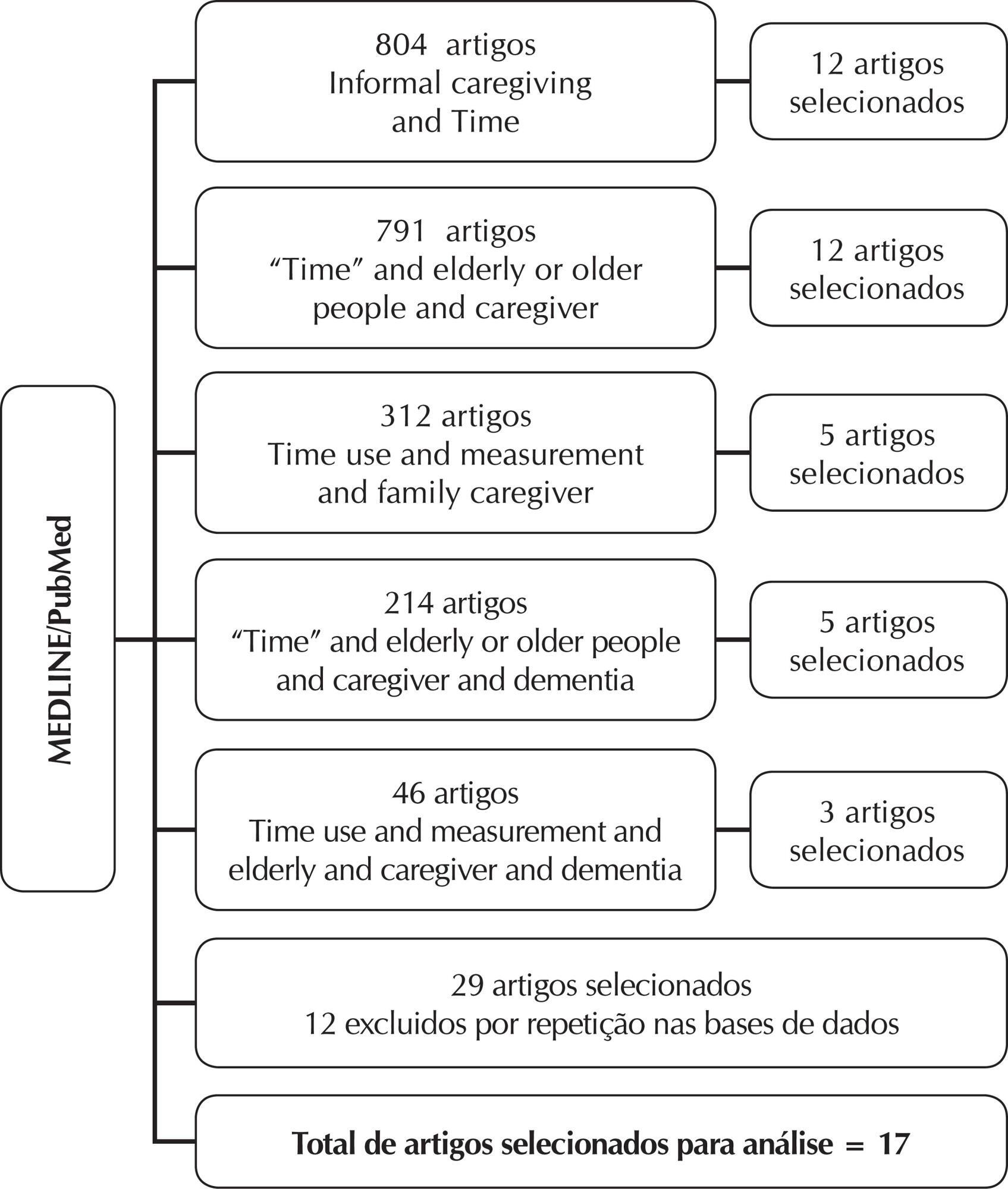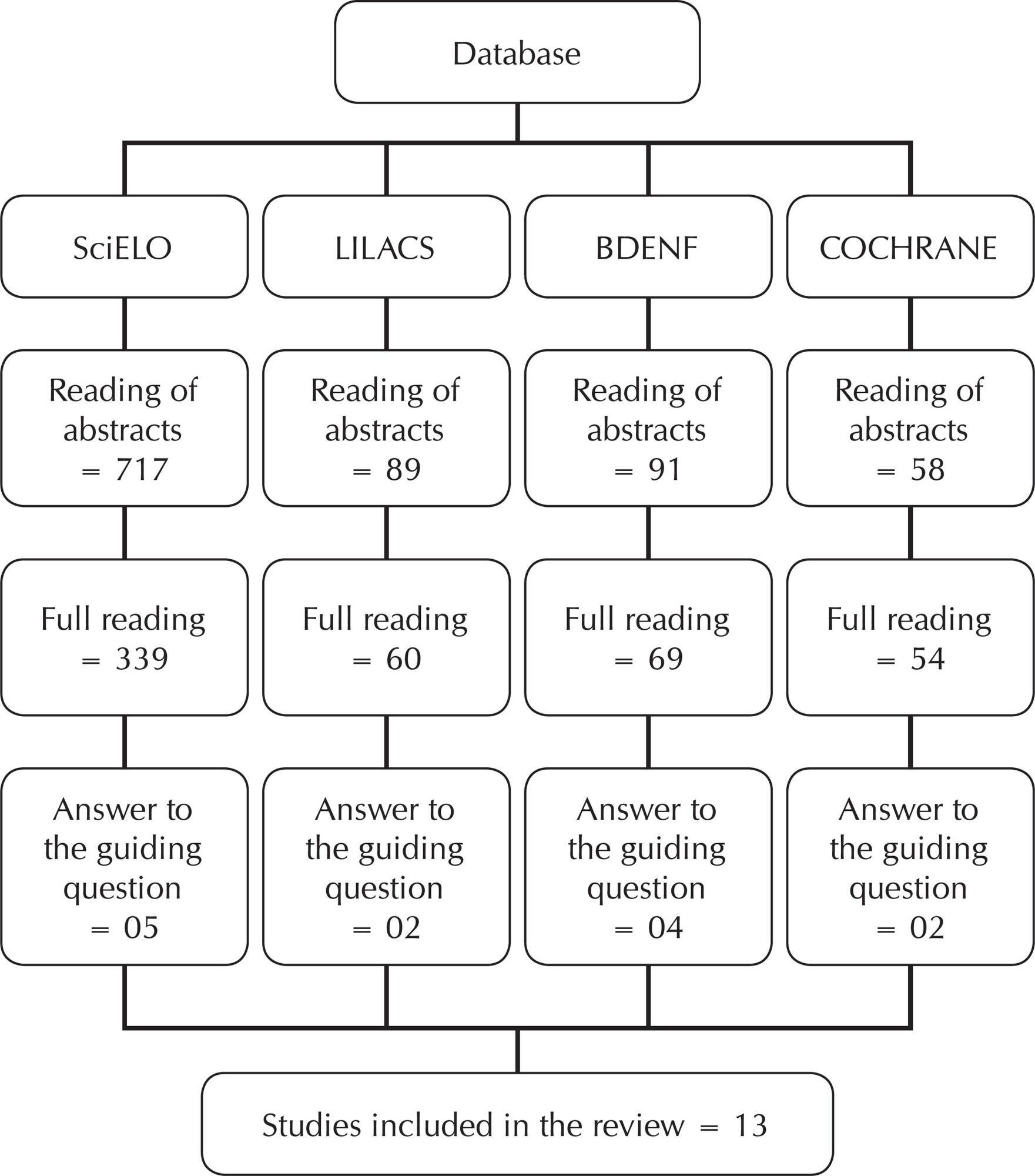-
EXPERIENCE REPORT01-01-2018
Conversation map: an educational strategy in the care of elderly people with diabetes mellitus
Revista Brasileira de Enfermagem. 2018;71:925-929
Abstract
EXPERIENCE REPORTConversation map: an educational strategy in the care of elderly people with diabetes mellitus
Revista Brasileira de Enfermagem. 2018;71:925-929
DOI 10.1590/0034-7167-2017-0064
Views0See moreABSTRACT
Objective:
To report the experience of using diabetes conversation maps as an educational strategy for diabetic elderly people.
Method:
Experience report, conducted from July to December 2016 in a specialized outpatient clinic for diabetics, in Fortaleza, Ceará, Brazil. A total of 72 users participated, between diabetics and those accompanying them.
Results:
The participants talked about issues that were not addressed in personal consultations, and could see themselves through the stories of others, thus realizing they were not alone and that others also experienced the same difficulties as them. Through empathy and the accounts of others, participants built knowledge and practices for their own daily lives.
Final Considerations:
The conversation map enables professionals to empower patients with diabetes, promoting self-care and ensuring better control over the disease, in order to prevent or delay the onset of related complications.
-
EXPERIENCE REPORT01-01-2018
Active methodologies for graduation in nursing: focus on the health care of older adults
Revista Brasileira de Enfermagem. 2018;71:920-924
Abstract
EXPERIENCE REPORTActive methodologies for graduation in nursing: focus on the health care of older adults
Revista Brasileira de Enfermagem. 2018;71:920-924
DOI 10.1590/0034-7167-2017-0150
Views0See moreABSTRACT
Objective:
To describe the experience of the use of simulation as active teaching methodology in the Developmental Psychology discipline and share its impacts on the students’ learning process.
Method:
Based on Active Methodologies, the students in Nursing of Universidade do Oeste Paulista – Presidente Prudente-SP developed simulated visits to older users of the Family Health Strategies.
Results:
In accordance with the 2014 National Curriculum Guidelines and the Brazilian Unified Health System, particularities of the needs of older adults at their homes were problematized.
Final considerations:
Addressing the biopsychosocial needs and integrality associated with the health of older adults in simulated home visits provides a differentiated instrument in the development of skills and competence of future nurses.
-
REVIEW01-01-2018
Gerontological contributions to the care of elderly people in long-term care facilities
Revista Brasileira de Enfermagem. 2018;71:912-919
Abstract
REVIEWGerontological contributions to the care of elderly people in long-term care facilities
Revista Brasileira de Enfermagem. 2018;71:912-919
DOI 10.1590/0034-7167-2017-0357
Views0See moreABSTRACT
Objective:
To analyze Brazilian scientific productions from the last 11 years which show the contributions of nursing to elderly people in long-term care facilities.
Method:
This is an integrative literature review. The search took place in the Virtual Health Library (VHL) in the BDENF and LILACS databases and the SCIELO virtual library, between June and October 2016, using the keyword long-term care facility and the descriptors nursing and geriatrics.
Results:
Eleven studies were selected, published 2005 and 2016, with various methodological approaches that enabled discussion of the proposed objective.
Conclusion:
The contributions of nursing to institutionalized elderly people were linked to health promotion measures, as well as simple interventions, such as listening, interacting, offering recreation and helping in psychoaffective relationships. These activities contributed to raising the self-esteem of the individuals.

-
REVIEW01-01-2018
Temporal analysis of the functional status of older people in the state of Paraíba, Brazil
Revista Brasileira de Enfermagem. 2018;71:905-911
Abstract
REVIEWTemporal analysis of the functional status of older people in the state of Paraíba, Brazil
Revista Brasileira de Enfermagem. 2018;71:905-911
DOI 10.1590/0034-7167-2017-0130
Views0See moreABSTRACT
Objective:
To verify the profile and the functional status of older people living in the state of Paraíba, Brazil, from a temporal perspective.
Method:
This was a descriptive study with secondary analysis of data from the Health Indicator and Aging Policy Monitoring system (SISAP-Idoso – Sistema de Indicadores de Saúde e Acompanhamento de Políticas do Idoso) between 2000 and 2010.
Results:
Over the analyzed period, there was a growth of older women, people older than 85 years, residents of urban areas, older people who live alone and who are not responsible for the household. There was also a decrease of illiterate older people, with monthly income of up to one minimum wage and in poverty situations. Concerning the functional status, the proportion of older people who reported any permanent mental, motor, visual or hearing disabilities has increased.
Conclusion:
We suggest that the assistance must be directed towards environmental variables that can influence the functional state, such as illiteracy, low income and disabilities that contribute to the weakening of older people and must be overcome.
-
REVIEW01-01-2018
Time use by family caregivers of elderly with dementia: an integrative review
Revista Brasileira de Enfermagem. 2018;71:893-904
Abstract
REVIEWTime use by family caregivers of elderly with dementia: an integrative review
Revista Brasileira de Enfermagem. 2018;71:893-904
DOI 10.1590/0034-7167-2017-0268
Views0See moreABSTRACT
Objective:
To describe the development of measures used between 1993 and 2016 to evaluate time use by family caregivers of elderly with dementia and to find out the patterns of time use identified in the literature.
Method:
An integrative review of articles was performed, indexed by the following terms: time use management, family caregiver and elderly.
Results:
A total of 17 articles were found, of which seven were methodological. Among these seven articles, five were psychometric. The most frequently used measures were self-reporting (matrices, questionnaires and inventories), validated through objective measures of occurrence and duration. Longitudinal, prospective, clinical and correlational studies showed that care time covaries with the receptors’ dependence and that the caregivers’ subjective well-being is more affected by the time restriction to free choice activities than the burden resulting from obligatory activities.
Final considerations:
Valid self-reporting measures are widely used nowadays and they are considered to be effective to assess the objective and subjective costs of health care for dementia.

-
REVIEW01-01-2018
Integrative review of literature: nursing care to aged people with HIV
Revista Brasileira de Enfermagem. 2018;71:884-892
Abstract
REVIEWIntegrative review of literature: nursing care to aged people with HIV
Revista Brasileira de Enfermagem. 2018;71:884-892
DOI 10.1590/0034-7167-2017-0264
Views0See moreABSTRACT
Objective:
To identify evidences in scientific Brazilian literature on nursing care to aged people with HIV.
Method:
Integrative review of literature from databases: Latin American and Caribbean Literature on Health Sciences (LILACS), Scientific Eletronic Library Online (SciELO), Cochrane and the Nursing Database (BDENF). The applied inclusion criteria were publications that were fully available from 2001 to 2015 and answered to the guiding question of this study.
Results:
We included 13 studies; and the categories that allowed a better presentation of the scientific evidence on nursing care to aged people with HIV carrier were: Epidemiological profile, perceptions and experiences of aged people with HIV and nursing care to aged people with HIV.
Conclusion:
The studies address nursing care from a clinic that follows NANDA diagnoses of strong individualizing approach and low consideration of social aspects.

-
01-01-2018
Perfil do índice de massa corporal e fatores associados em idosos ativos
Revista Brasileira de Enfermagem. 2018;71:876-883
Abstract
Perfil do índice de massa corporal e fatores associados em idosos ativos
Revista Brasileira de Enfermagem. 2018;71:876-883
DOI 10.1590/0034-7167-2016-0683
Views0See moreRESUMEN
Objetivo:
Identificar el perfil del índice de masa corporal y factores asociados en adultos mayores activo. Es un tipo de análisis de la investigación con diseño transversal y un enfoque cuantitativo con una muestra de 105 personas de edad avanzada.
Método:
El instrumento de investigación consistió en: la evaluación cognitiva, datos sociodemográficos, condiciones de salud y la evaluación del rendimiento del motor. Los datos fueron analizados mediante el análisis descriptivo y regresión logística binaria.
Resultados:
La persona de edad avanzada que no tiene compañero tiene 7.753 veces más probabilidades de tener exceso de peso en comparación con el viejo. Tener un ingreso mayor que el salario mínimo es 6.014 veces más probabilidades de tener sobrepeso. No tiene problemas de salud asciende a 0.015 veces la probabilidad de tener sobrepeso. El rendimiento del motor no presenta saldo de la limitación es 6.785 veces más propensos a ser afectados por el exceso de peso.
-
REVIEW12-21-2020
Strategies and competences of nurses in men’s health care: an integrative review
Revista Brasileira de Enfermagem. 2020;73:e20190546
Abstract
REVIEWStrategies and competences of nurses in men’s health care: an integrative review
Revista Brasileira de Enfermagem. 2020;73:e20190546
DOI 10.1590/0034-7167-2019-0546
Views0See moreABSTRACT
Objectives:
to synthesize scientific evidence on nurses’ strategies and competencies in men’s health care.
Methods:
an integrative review carried out in seven databases, with a time frame from 2009 to 2019, using the descriptors “men’s health”, “professional competence”, “nursing”, “nursing care” and “male” in Portuguese and in English.
Results:
ten articles were selected, in which it was demonstrated that nursing professionals develop their professional practices with regard to men’s health care, in convergence with the general skills of the profession. The most used are health care; decision-making; Communication; administration; management; continuing education and leadership, consecutively.
Final Considerations:
professionals’ efforts to strengthen health actions, aimed at male needs, in accordance with the general skills of the profession and the principles and guidelines of the Brazilian National Policy for Comprehensive Care to Men’s Health.

-
ORIGINAL ARTICLE09-16-2019
Social representations of HIV/AIDS by older people and the interface with prevention
Revista Brasileira de Enfermagem. 2019;72(5):1129-1136
Abstract
ORIGINAL ARTICLESocial representations of HIV/AIDS by older people and the interface with prevention
Revista Brasileira de Enfermagem. 2019;72(5):1129-1136
DOI 10.1590/0034-7167-2017-0748
Views0See moreABSTRACT
Objective:
To apprehend the social representations elaborated by older people about HIV/AIDS and to understand how they relate to the prevention of HIV infection.
Method:
Descriptive and qualitative research based on the Theory of Social Representations with 42 older people assisted at primary care. Data were produced through in-depth interviews with a semi-structured instrument, processed in the IRaMuTeQ software, and analyzed by means of the descending hierarchical classification.
Results:
Five classes emerged: “HIV/AIDS: a problem of young people”; “Quality of life improvement for people living with HIV/AIDS”; “Vulnerability to HIV/AIDS among heterosexual women in a stable union”; “HIV/AIDS Information Network: process of creation and transformation of social representations” and “Prevention versus stigma”.
Final considerations:
The social representations that older people have about HIV/AIDS influence the adoption of preventive measures negatively because stigma is present and HIV/AIDS is attributed to young men, and to men who have sex with other men.

-
ORIGINAL ARTICLE09-21-2020
Autonomy in the reproductive health of quilombolas women and associated factors
Revista Brasileira de Enfermagem. 2020;73:e20190786
Abstract
ORIGINAL ARTICLEAutonomy in the reproductive health of quilombolas women and associated factors
Revista Brasileira de Enfermagem. 2020;73:e20190786
DOI 10.1590/0034-7167-2019-0786
Views0See moreABSTRACT
Objective:
Identify the level of reproductive autonomy of quilombola women and associate it with sociodemographic characteristics and aspects of sexual and reproductive health.
Methods:
Cross-sectional census study carried out in quilombola communities in a municipality in Bahia. Data was collected through questionnaires from the National Health Survey and the Reproductive Autonomy Scale, applied to quilombola women who agreed to participate. Descriptive statistics procedures were used and associations were made between reproductive autonomy scores and sociodemographic and reproductive characteristics.
Results:
The average total score for reproductive autonomy was 2.06. An association was found between the “decision-making” score and marital status. The score for “total reproductive autonomy” was associated with the use of contraceptive method.
Conclusion:
The reality of the study participants converges with the literature regarding the interference of sociodemographic and reproductive factors in the reproductive autonomy of black women.
-
ORIGINAL ARTICLE08-19-2019
Psychosocial risks related to the nurse in the psychiatric hospital and management strategies
Revista Brasileira de Enfermagem. 2019;72(4):834-840
Abstract
ORIGINAL ARTICLEPsychosocial risks related to the nurse in the psychiatric hospital and management strategies
Revista Brasileira de Enfermagem. 2019;72(4):834-840
DOI 10.1590/0034-7167-2017-0311
Views0See moreABSTRACT
Objective:
To characterize the presence of psychosocial risks related to the work of the nurse in a psychiatric hospital and the strategies for managing these risks.
Methods:
Qualitative, in which 25 nurses from a psychiatric hospital participated using semi-structured interviews from November 2014 to January 2015. Data analysis was performed using the thematic method.
Results:
The results showed psychosocial risks related to the work of psychiatric nurses, such as: insufficient academic training; lack of preparation and maintenance of equipment; poor relationship with colleagues; shortage of human resources and lack of capacity building; conflict between the demands of the home and work, as well as strategies for managing psychosocial risks such as family, cinema, music, reading, among others.
Final considerations:
This study should provoke the reflection of managers and future nurses regarding the working conditions in a psychiatric hospital and possible psychosocial risks to which they are exposed.
-
EXPERIENCE REPORT07-01-2020
Generating meaningful conversation: World Café in strategic interprofessional planning in Continuing Education
Revista Brasileira de Enfermagem. 2020;73(5):e20190279
Abstract
EXPERIENCE REPORTGenerating meaningful conversation: World Café in strategic interprofessional planning in Continuing Education
Revista Brasileira de Enfermagem. 2020;73(5):e20190279
DOI 10.1590/0034-7167-2019-0279
Views0See moreABSTRACT
Objectives:
to present the particularities of the World Café, identifying the main aspects that characterize a planning strategy for a constructive, interactive, and participative dialogue of the individuals, aiming at collaborative and innovative learning.
Methods:
a World Café method workshop with 24 professionals from the teams that work in basic health units.
Results:
we obtained three analysis categories: Individual Needs, Group Needs, and Institutional Needs, which resulted in the Municipal Plan of Actions on Continuing Health Education.
Conclusions:
we found that the World Café was adequate and relevant for the discussion of key themes, for the practices of teams in Primary Care and the production and organization of data in a collective space.
Final Considerations:
the method can contribute to the construction of knowledge and proximity to the daily reality of interdisciplinary teams, as well as serving as a tool in the preparation of planning in Permanent Education.
-
06-28-2021
Trends in fertility rates, proportion of antenatal consultations and caesarean sections among Brazilian adolescents
Revista Brasileira de Enfermagem. 2021;74:e20200884
Abstract
Trends in fertility rates, proportion of antenatal consultations and caesarean sections among Brazilian adolescents
Revista Brasileira de Enfermagem. 2021;74:e20200884
DOI 10.1590/0034-7167-2020-0884
Views1See moreABSTRACT
Objective:
To analyze the temporal trends in the fertility rate, proportion of antenatal consultations and caesarean sections in Brazilian adolescents aged 15 to 19, between 2000 and 2015. Methods: The fertility rate, proportion of prenatal consultations and proportion of routes of birth were calculated using data from DATASUS. The trend analysis was performed using the Prais-Winsten regression model and the annual percentage change.
Results:
There was a trend of reduction of 3.5% per year in the fertility rate among adolescents (p<0.05), in addition to an increasing trend of 6% per year in the proportion of more than six antenatal consultations (p <0.0001) and an increasing trend of 6.8% per year in the proportion of caesarean sections (p<0.0001).
Conclusion:
Despite the decreasing trend in fertility rates among Brazilian adolescents, they remain high. Also noteworthy is the growing trend for caesarean sections, even with improved access to antenatal care.

-
ORIGINAL ARTICLE03-30-2020
Implication of the training ad continuing education process for the interprofessional performance
Revista Brasileira de Enfermagem. 2020;73(2):e20180359
Abstract
ORIGINAL ARTICLEImplication of the training ad continuing education process for the interprofessional performance
Revista Brasileira de Enfermagem. 2020;73(2):e20180359
DOI 10.1590/0034-7167-2018-0359
Views0See moreABSTRACT
Objetives:
to analyze the implication of the training/continuing education process of professionals of the Expanded Nucleus of Family Health and Basic Care (Portuguese acronym: Nasf-AB) for their interprofessional performance.
Methods:
a qualitative case study performed with Nasf-AB teams representative of four macro-regions of health of the state of Santa Catarina. Participation of 43 professionals, who answered collective interviews. The results were later submitted to thematic analysis.
Results:
the training is strongly influenced by the Biomedical Model, which acts as an obstacle to interprofessional performance, given the challenges in the daily routine of Nasf-AB professionals. Continuing education emerges as a potential for the successful collaborative work among teams, and between the teams and Family Health professionals.
Final considerations:
there are important limits in the training of professionals. However, the constant interprofessional development promoted by strategies of continuing education contributes to broaden the support and collaborative practices that qualify services and strengthen Basic Care.
-
ORIGINAL ARTICLE05-28-2021
Authentic leadership, nurse satisfaction at work and hospital accreditation: study in a private hospital network
Revista Brasileira de Enfermagem. 2021;74(2):e20200227
Abstract
ORIGINAL ARTICLEAuthentic leadership, nurse satisfaction at work and hospital accreditation: study in a private hospital network
Revista Brasileira de Enfermagem. 2021;74(2):e20200227
DOI 10.1590/0034-7167-2020-0227
Views0See moreABSTRACT
Objectives:
to identify the dominant dimensions of the authentic leadership of nurses in a private hospital network and to verify the association with job satisfaction and accreditation.
Methods:
cross-sectional, analytical study carried out in 11 hospitals with 282 nurses, of which 94 were leaders and 188 were led. Participants answered the Authentic Leardership Questionnaire and the Job Satisfaction Survey.
Results:
there was a significant difference between the assessment of leaders and followers in all dimensions of the Authentic Leardership Questionnaire. Regarding the association of authentic leadership and job satisfaction, a significant positive moderate correlation was found among the employees. In hospitals accredited by the Joint Commission International, leaders were perceived as more transparent by their subordinates.
Conclusions:
there was correlation between authentic leadership and job satisfaction and authentic leadership and the accreditation model among the subordinates.
Search
Search in:
Nuvem de Tags
Adolescente (85) Atenção Primária à Saúde (239) COVID-19 (91) Criança (91) Cuidados de Enfermagem (269) Educação em Enfermagem (151) Educação em Saúde (139) Enfermagem (930) Enfermagem Pediátrica (86) Estudantes de Enfermagem (77) Estudos de Validação (131) Família (87) Idoso (208) Promoção da Saúde (99) Qualidade de Vida (104) Saúde do Trabalhador (86) Saúde Mental (145) Saúde Pública (82) Segurança do Paciente (150) Tecnologia Educacional (100)



